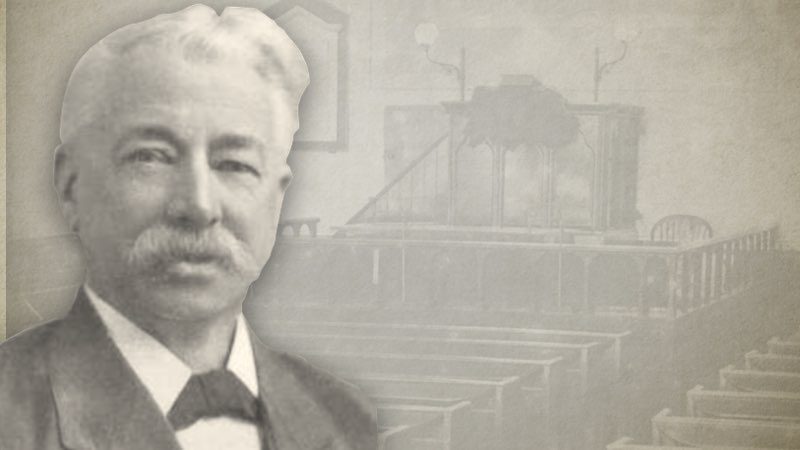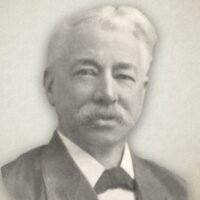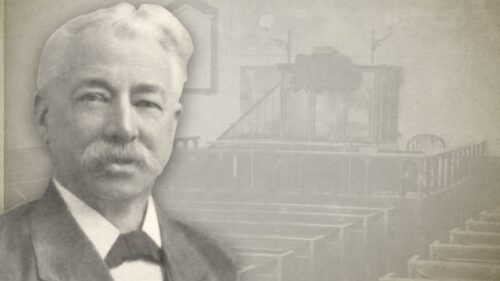
Children Of Light
A Sermon Preached By John Booth At Providence Chapel, Croydon, On February 15th, 1903.
I suppose we may speak of Divine evidences proving regeneration as of a twofold nature: 1. Internal, those that are felt. 2. External, those that are seen. As the external can be counterfeited, it is best to take the internal first. We may weep (and I love a soft heart), but Esau wept. We may have much zeal for the truth and God’s cause, as Jehu had; but let us not take it as an evidence of grace. We may walk softly when God’s judgments are before us, as Ahab did; this is not an evidence of divine life. We may figiht God’s battles; Saul did, but it was no proof of grace. We may ask the Lord’s people to pray for us, as Simon Magus did; but that was no evidence of grace. It is better to decide by internal evidences. We do not judge so much by what we see outwardly, unless we see something decidedly bad; then we must judge people as the Saviour said, “by their fruits.”
When we first meet with a stranger who makes a profession of religion, we like to talk to him and find out a little of his inward life before we can judge of him. If we see a man walk circumspectly, we cannot altogether judge by that.
There are two distinct classes of people spoken of in the text, and you and I belong to one or the other. There is 1. a nation mentioned; and 2. a people in the midst of a nation. Are we these people, or are we the nation itself? Paul’s prayer was that these people might be blameless in the midst of the nation. I love this Epistle.
Paul was closely attached to this church. He had seen a man in a vision, who had said to him, “Come over to Macedonia and help us;” and Paul went. In this town of Philippi he comes upon a few poor Spirit-taught people who had met by the riverside to pray. Paul spoke to them, and this was the beginning of the formation of the church at Philippi.
We read of one woman named Lydia, “whose heart the Lord opened, that she attended unto the things which were spoken of Paul” (Acts 16:14). If a man is in business, and does not attend to his business, it is most probable that he and his business will both soon go down. Religion is a solemn thing, it is not to be played with. To attend to it for a day or two, and then leave it a month, a child of God can hardly do this.
As Paul met with these people outside the city—for they met outside, just as our Master was crucified “withojut the camp”), there was a damsel there who had a spirit of divination, and she brought her master much gain by it. She followed Paul, and cried after him, and eventually he spoke to the evil spirit, which came out of her. This resulted in Paul being cast into prison. It was God’s way to bring Paul to a man who could not get to a prayer-meeting. This man (the gaoler) was a servant of men, and he could not leave the prison, and through Paul being brought there he was converted.
A church was formed at Philippi, and Paul prayed for this people. You cannot help praying for people that you love. Paul prayed that they might be ” blameless and sincere” (as the margin reads), “the sons of God, without rebuke in the midst of a crooked and perverse nation.”
I like to take notice of every word in the text. I do hot believe there are many waste words in the Word of God. If we had more wisdom, and could analyse every word and sentence, we should see more beauty in it. Here a perverse nation is spoken of; not a village, or town, or county, but a multitude of people. We are in the midst of people, as a ship is in the midst of waves. If so, we must expect to have the waves against us, the tide against us, the wind against us, everything against us, and be brought out of every refuge to Christ. We are as a rose in the midst of thorns, and they will prick.
You cannot go against public opinion without opposition; God’s truth is not popular. If you see a notice up outside a so-called place of worship, “Popular Services,” you may be sure there is not much of God’s truth there, for God’s truth is not popular. People in the times of the prophets were always religious, not always divinely so; they wanted something more popular, and some bowed down to idols. Christ said to His disciples, “Behold, I leave you as lambs in the midst of wolves.” We are just as sheep among wolves. If we have our faces towards God, they are against all that is against God’s truth. We must go against the stream. The truth is everlasting; it has not altered, it is unchangeable. I used to stumble at this word: “I will leave in the midst of thee an afflicted and poor people.” I thought there were a few afflicted people. I find now that there is a church within a church, just as we read in Ezekiel of “a wheel within a wheel.” “And they shall trust in the Name of the Lord”—that is their distinguishing feature. Even if circumstances are against them, and all is darkness around them, yet there is hope in their hearts. After the rest of the Jews had been taken captive to Babylon, we read that there were a few vine-dressers left in the land. Are we among these afflicted people? because those are the people that will get to heaven.
“In the midst of a crooked and perverse nation.” Sin is always crooked, and Paul speaks of crookedness as a national evil, and of perversity as a national crime. This is the crookedness not of one man, but of the nation; it is a sweeping statement. We may exalt our nation, and in many ways we have reason to do so. We have many excellent laws, and while they remain we have liberty of conscience; but I am afraid that many would be glad to alter these laws. There are many reasons why we should think highly of our nation, but when we come to Divine things we find it is crooked and perverse. Look at the tastes of the people; the nation shows perverse tastes. Look at the literature of today, it shews a perverted taste; though I know there are many Bibles in the land, and many more than are read.
Paul desires that the people may be “blameless and harmless, the sons of God, without rebuke in the midst of a crooked and perverse nation;” and thirdly, he says, “Among whom ye shine as lights in the world.” There is nothing legal in Paul’s prayer; therefore, there ought to be nothing legal in our taking this text, or in our remarks. We do not often perhaps speak of the walk of a child of God, for we feel that if a man has grace inside, it is sure to come out. Grace in a man will be such as will preserve him, though I know that a child of God may fall. Have you ever fallen? have you ever backslidden? There are two ways of doing so. You may have backslidden outwardly, and brought reproach on the cause of God. We need to pray to God to keep us. And we may backslide inwardly.
If a brother has fallen outwardly, you may say, “Oh, So-and-so has fallen into sin.” He had fallen before, only you could not detect his heart; he had neglected the Throne of grace probably for months before. But even out of all this God can bring good, for sometimes an outward fall brings a saint to his senses.
“That ye may be harmless.” Doves are harmless— saints are doves; sheep are harmless—saints are sheep; little children are harmless—saints are little children. Do not speak of saintship if you are not harmless. If one member falls, it affects the whole church. If one member of a body suffers, all the members suffer with it. And if one of a congregation falls—one who has not so much as made an open profession, who has not been baptised and come to the Lord’s Table—yet the congregation are reproached by that fall.
“That ye may be blameless and harmless, the sons of God, without rebuke in the midst of a crooked and perverse nation, among whom ye shine as lights in the world;” that is, that you may not give this crooked nation a handle. Paul prays that the church may walk so that there is nothing for the world to lay hands on against them.
“The sons of God “—this is a nice word; we have meat to eat that the world knows not of. Adam begets a son, and he is a son of man; God begets a Son, and He is the Son of God. Christ was called the Son of the Highest (Luke 1:32), and He is our Elder Brother.
“Among whom ye shine as lights in the world “—there is a practical bearing again here. Sometimes we fear we have only light enough to show our deformity. As we grow older and have our eyes turned within, instead of being lights in the world, we are afraid we are all darkness. But there is a wonderful difference between having this light which shows our deformities, and from walking in the light of sparks of our own kindling. I believe that the man who does this is satisfied with himself and his religion. He who has true light is always dissatisfied with himself; he feels as the Psalmist did when he said, “I shall be satisfied when I awake with Thy likeness” (Ps 17:15). Light is an emblem of salvation; light is an emblem of deliverance. “For ye were sometimes darkness, but now are ye light in the Lord, walk as children of the light.”
If we ever had the word of God drop in our hearts (it may be suddenly), I will tell you what it does, it brings light with it: “The entrance of Thy word giveth light.” Christ is light. He said, “I am the Light of the world.” When on earth He said to His disciples, “Let your light so shine before men that they may see your good works, and glorify your Father which is in heaven” (Matt 10:16). It is a great mercy to have grace given us to walk so that men may see that we are different from other people. Take particular notice of the little word “so” in this text: “Let your light so shine” as to glorify God. I believe that all things shall tend to the glory of God, though it seems a difficult truth for us to believe.
There will be light and darkness in our hearts, but there must be a difference between a man in whom God works and those in whom Satan works. You may be exercised; I am continually exercised as to my standing in Christ. I often feel at night, “What if I were to die before morn- ing; how would it be with me?” We need something to die with. And we are brought to plead before God that we may shine as lights in the world. It is sometimes! difficult to believe that God has imparted light to us. Our feeling is:
“Lord Jesus, shine, and then I can,
Feel sweetness in salvation’s plan;
And as a sinner plead for grace,
Through Christ the sinner’s Hiding-place.”
And you may say with Berridge:
“In darkness born I went astray,
And wandered from the gospel way;
But since the Saviour gave me sight,
I cannot see without His light.”
You do not like darkness; you want to see light in God’s light; you want to walk in the light and in the sight of His people. If you desire the light of God, you desire that you may be right in the sight of His people. May God preserve you blameless and harmless, or, as the margin reads, sincere, which means literally “without wax.”
A sculptor told me once that years ago, when certain kinds of granite were wanted and were very difficult to obtain, people sometimes used that which was inferior, and inserted wax in the flaws, so as not to be detected. Their action was not revealed till the sun shone and melted the wax, and storms came on the stone; then its faults were seen, and the deeds of the contractors brought to light.
Paul’s desire for these Philippians was that they might be blameless and harmless and honest, “without wax,” in the midst of a crooked nation. There was deceit enough, craft enough, blameableness enough in the nation; he wanted God’s people to be blameless.
May God preserve you unto Himself, and may He add His blessing, and He shall have the glory. Amen.
John Booth (1861-1928) was a Strict and Particular Baptist preacher. He was appointed the Pastor of Zoar Particular Baptist Chapel, Bradford, a position he served for thirty years. Walter Brooke wrote of him:
“With mingled feelings of pleasure and sorrow I accede to the request to write a short Foreword to the memoir of the life of my late beloved and esteemed friend. His removal is a great personal loss to me, having walked in loving friendship with him for about thirty years. Un- broken fellowship is a choice and rare privilege in these days when misunderstanding too often sadly mars our communion. In dear John Booth one possessed a friend to whom the heart could be opened freely. And if one was compelled to differ in judgment, which in this present imperfect state is well-nigh inevitable at times, there was no fear of communion being in any degree interrupted. His mind was large enough to admit that the freedom he claimed for himself should be accorded to others. Many interesting, entertaining and profitable hours did we spend together in friendly argument and discussion. Of him as a preacher one needs not to say much, as his praise is in the churches. But having had the privilege of hearing him on several occasions, perhaps a little personal testimony may be seasonable. His style was very clear and concise; his remarks very direct and pointed. This was the result of much prayerful thought and careful study. Our friend was no loiterer in the Lord's vineyard. Here is a specimen of his terse and suggestive mode of teaching: I was listening to my esteemed friend on a special occasion, and as he read his lesson, on reaching the words, " Thy kingdom come, Thy will be done," he paused, and in a most forceful manner remarked, Do you know what that means ? That means, Crucify me.” What a volume of meaning appeared to me in these few words! His simplicity of purpose, and the fearless expression of his deep convictions, were marked features of his preaching. There was no mistaking his meaning. John Booth believed and acted upon the words of his Lord and Master, " And call no man your father upon the earth, for One is your Father which is in heaven; neither be ye called masters, for One is your Master, even Christ." He sought his message from his Lord, and delivered it " not with enticing words of man's wisdom," but that "which the Holy Ghost teacheth, comparing spiritual things with spiritual." His labours were indeed abundant. His heart was in his loved work, and he always aimed to give his hearers of his very best. During my long, painful affliction his tender sympathy was marked, and he believed the time would come when I should again testify of the grace and love of the Lord Jesus. And it is my great comfort that he was spared to know that his convictions were true. In September of last year we met in Sussex, and I then heard him preach, from Rev. 19:6: "And I heard as it were the voice of a great multitude, and as the voice of many waters, and as the voice of mighty thunderings, saying, Alleluia: for the Lord God omnipotent reigneth." How we rejoiced together! On hearing of his lamented end, my heart was gladdened amid the sorrow in reflecting that his ransomed soul had joined the heavenly host in singing " Alleluia!” May those who have taken in hand the production of this volume be cheered and encouraged by a quick and extensive sale. And may we who are left for a while to labour on, remember the word of exhortation: "Whose faith follow, considering the end of their conversation, Jesus Christ, the same yesterday, and to-day, and forever."
John Booth Sermons




